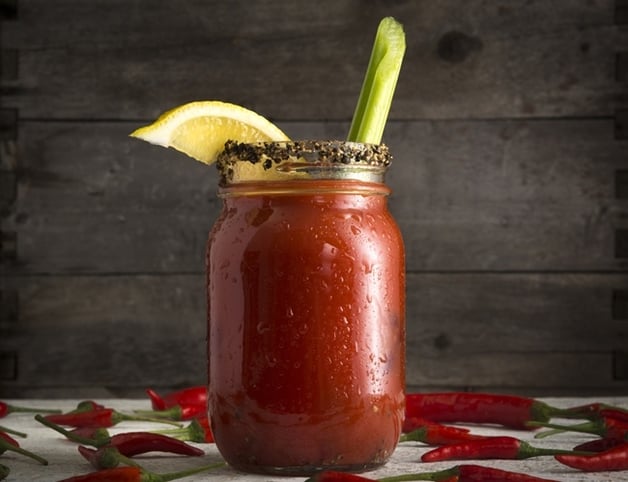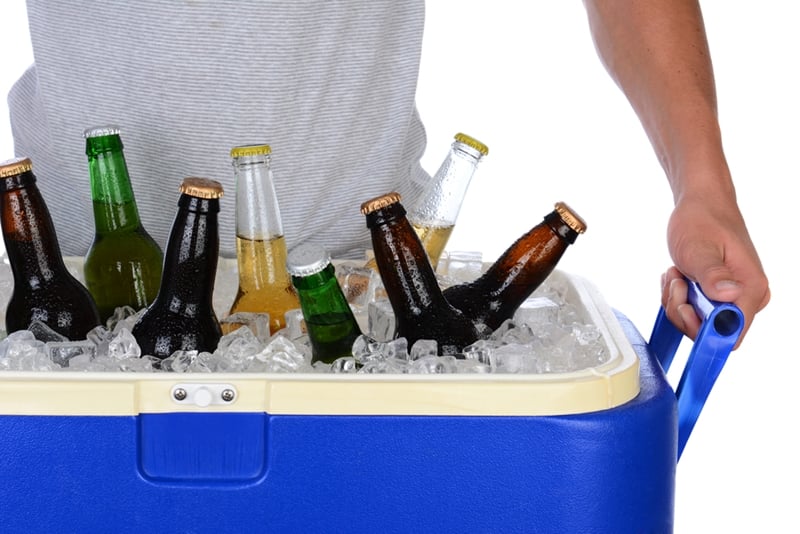
In case you need any more reason to find good alcoholic drinks, here's a staggering statistic: The top-drinking adults consume 73.85 drinks each week on average. As The Washington Post highlighted, that's equivalent to "four-and-a-half 750 ml bottles of Jack Daniels," per week, or more than 10 drinks per day.
Surprisingly enough, from an oral health perspective, there actually are relatively healthy alcoholic drinks you can choose from. And, there are some choices you’re better off avoiding. One of the most eye-opening discoveries for many drinkers is the fact that it’s not the alcohol in their favorite drink that’s the real culprit, it’s what they mix it with. (For some, er… sobering statistics, check out the American Dental Association’s study of beverage acidity, covering sodas, teas, fruit juices, and energy drinks, among others.)
Let's take a look at how some of your favorite drinks can impact your dental health so you can make educated decisions this weekend:
Best drinks for your teeth
Take this category with a grain of salt (or a glass rim of it).
Nutritionally, there really is no such thing as a healthy alcoholic drink. Alcohol supplies empty calories, little to no nutrition, and is often paired with high-calorie mixers like juice and soda. Likewise, none of these beverages are necessarily "good" for your dental health because most adult beverages are loaded with sugar and are highly acidic. According to the Indiana Dental Association, acid eats away at enamel, the tooth's protective surface, until the substance creates a hole known as a cavity.
But, everything’s relative. Foods with low acidity levels and sugar do not cause as much damage. Likewise with sugar-free, low acid alcoholic beverages. And, if you're going to drink anyway and you’re looking to cut down the negative impact on your oral health from a night out on the town, these are the best drinks for your teeth:
Light beer
You may have asked, “does beer stain the teeth?” and “what about beer and cavities?” If you’re really astute, you’ve probably wondered, “is beer acidic?”
To be clear, dark beers can stain the teeth. And, like other beverages, beer can cling to the surface of your teeth and provide food for the harmful bacteria that end up causing cavities. But, beer lovers are in luck.
Speaking with Good Housekeeping, Dr. Joseph Banker, founder of Creative Dental Care, explained that the high water content and relatively low acidity levels in light, low-carb beer make these brews a relatively safer option when it comes to dental health, especially compared to darker beers. Up the clean-smile factor by selecting beers that are also light in color to sidestep potential surface stains on your teeth's enamel.
Gin and tonic
A highball classic, sipping on a gin and tonic delivers more than just the air of sophistication. But, is gin bad for you from an oral health perspective? And what about the tonic water? As it turns out, this classic concoction provides a safer alternative to most cocktails when you consider the status of your smile.
First, both gin and tonic are clear liquids, which takes away the risk of staining your teeth. Second, Foodary categorizes 90-proof gin and tonic as "about neutral,"demonstrating that it’s a low acid alcohol choice because the tonic water helps neutralize the more acidic gin.
That being said, this drink doesn't entirely land in the safe zone — the carbonation in the tonic can contribute to dental damage. Make it a little better for your smile by loading up on the ice, which will water the drink down, and ditching acidic citrus garnishes like lime wedges.
Cava
According to Wine Folly, the Spanish sparkling wine cava tastes similar to champagne, carrying a slightly bitter flavor. While you can find it in both white and rosé varieties, the lighter the color, the lower your risk for surface stains. Additionally, compared with other beverages like Coca-Cola or sweet white wines, cava boasts a higher (less acidic) pH level between 3.5 and 4. Of course, a neutral pH level of 7, like that found in water, is ideal, but as far as adult beverages go, cava is about as good as it gets.
Worst alcoholic drinks for your dental health
Between high acidity levels, copious amounts of sugar and dark colors, certain cocktails can really shake and stir your dental health. Here are the worst alcoholic drinks to watch out for next time you hit the bar scene:
Whiskey and coke
Famously, Coke does a pretty good job cleaning corroded battery terminals in a pinch, so you can probably imagine what it can do to your teeth. As Wine Folly noted, Coca-Cola, with its harsh mix of carbonation and sugar, has a pH level of 2.5, which is about as low as it goes for beverages. Whiskey is no acidic angel, either. Both of these ingredients also have dark colors, too, which can worsen the risk for surface-level stains.
Of course, if your only choice is whiskey on its own or whiskey and coke, jettisoning all that sugar, acid, and carbonation makes whiskey the far better choice.
Vodka and cranberry
If you’re curious which alcohol is worst, vodka isn’t it. In fact, since it’s clear, vodka alone would never stain your teeth. And, the pH of vodka is 4.0 — about the same as gin and whiskey, and slightly less acidic than most wines and some beers. The trouble is, almost no one likes vodka on its own. And the mixer is where you run into trouble.
While cranberry juice might be well equipped to mask the pungent taste of vodka, you'll have to decide whether the benefits outweigh the oral care costs. Don't be fooled by the "fruit" label. Not only does cranberry juice stain your teeth with its deep purple color, but most varieties also have more sugar than a can of soda, according to the U.K. Local Government Association. It’s also highly acidic. In fact, the only fruit juices more acidic than cranberry are lemon and lime. (In case you’re wondering, there are no commonly available non-acidic fruit juices. If you happen to find freshly squeezed pear or watermelon juice at your local bar, they’re pretty good choices. But the surprising winner for lowest acidity in common fruit juice mixers is orange juice. Screwdriver anyone?)
Bloody Marys
Think again before taking a sip of this so-called cure for hangovers. Bloody Marys top the list of worst alcoholic drinks for your teeth.
They epitomize acidity with both the liquid contents and garnishes. Consider what gets mixed in with this drink: vodka, tomato juice, Worcestershire sauce and hot sauce, among other spicy and acidic ingredients. Top the glass off with garnishes like pickles and pepperoncini, and you're sipping on a dental death trap.
To be sure, Bloody Marys do have one saving grace: celery sticks. Not only are they packed with nutrients, but as NBC News explained, these crunchy veggies are abrasive and scrub your teeth with each bite. Basically, when you munch on celery, you're also casually whitening your teeth.
While alcohol carries serious risks for your oral health, there are steps you can take to curb the damage. Moderation is always key. Stay away from dark, sugar-laden drinks and sip on water throughout the night. Then, after a night on the town, be sure to end your evening with a thorough brushing to remove the remnants of your more questionable choices. Additionally, find a dentist and schedule regular appointments to better prevent decay.
So from millennials to boomers, this information is for you. With that much alcohol being consumed, related health concerns have to be in the back of your mind. But, right alongside the impact on the liver, stomach lining, and other medical concerns that get the lion’s share of the headlines, many people ask, “is alcohol bad for your teeth?”
Another thing millennials recognize is that making smart decisions about their health now can save time and money later on, not to mention the heartache caused by chronic illness. That's why so many are choosing to invest in a reasonably priced healthcare discount plan like Wellness Complete.



